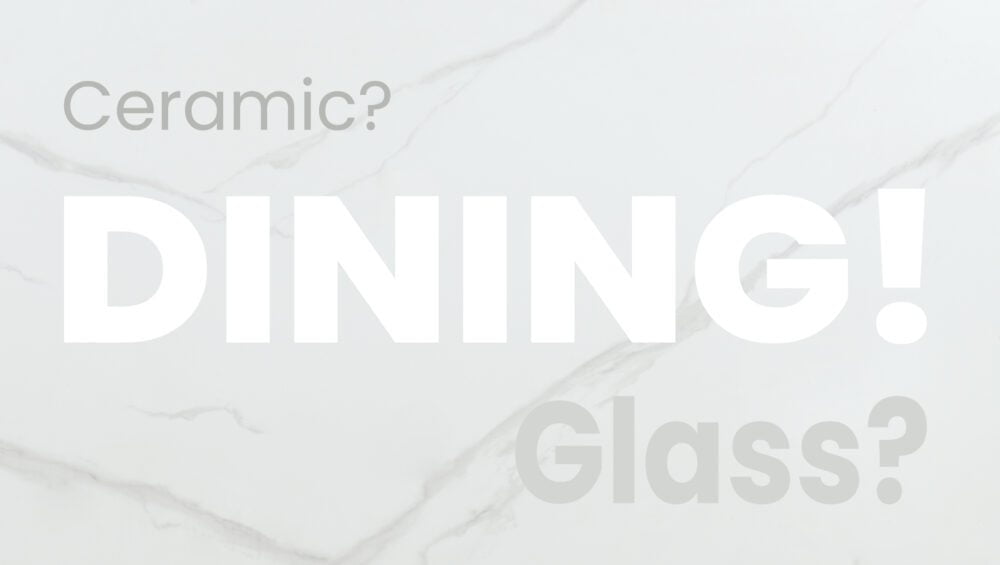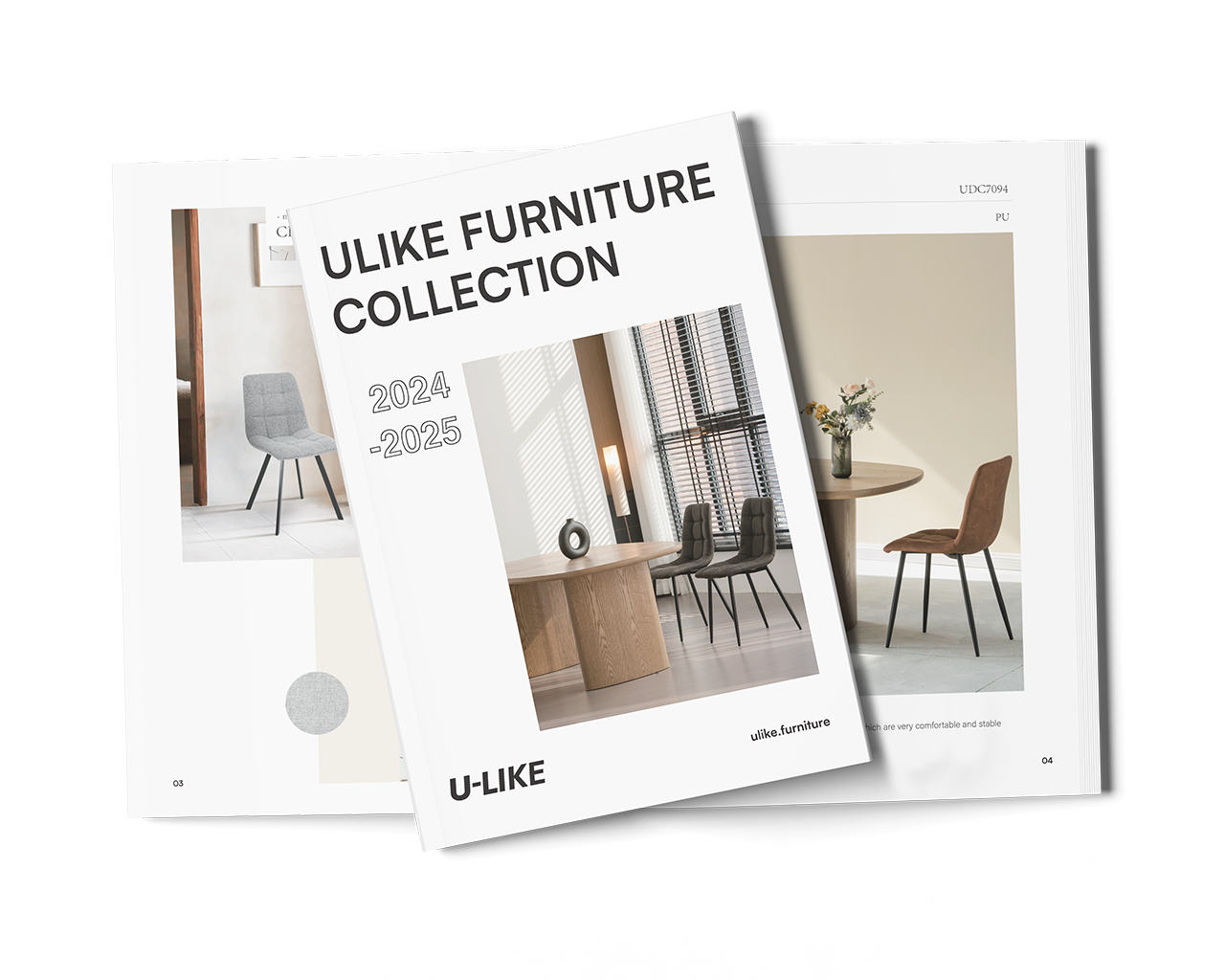Is a Ceramic Dining Table Right for Your Business? A Comprehensive Guide to Boosting Your Offerings
Since ceramic material entered the vision of furniture and was welcomed recently, you might wonder whether ceramic dining tables are worth considering for your business. In this comprehensive guide, we will address the questions that might cross your mind when evaluating ceramic dining tables, and offer you the method for using it to boost your business.
What is ceramic?
Ceramic dining tables are crafted predominantly from a blend of clay, minerals, and other natural elements. This concoction undergoes a meticulous high-temperature firing process, resulting in a robust and enduring foundation for the table.
Such precision in construction guarantees its ability to stand the test of time. With exceptional durability and strength, ceramic tables are an impeccable choice for those subjected to regular use and wear. Furthermore, the innate heat resistance of ceramic allows for the direct placement of hot plates and dishes without any risk of damage.
Why is it a good choice for dining table?
1. Durability
Ceramic tables are built to last. They can withstand the wear and tear of everyday use, making them a durable investment for any home. This durability ensures the customers can enjoy their dining tables for years to come.
2. Stain and Scratch Resistance
Ceramic tables are known for their resistance to stains and scratches. This makes them an excellent choice for dining settings, where accidents and spills are common. Customers won’t have to worry about permanent stains or unsightly scratches marring the beauty of their tables.
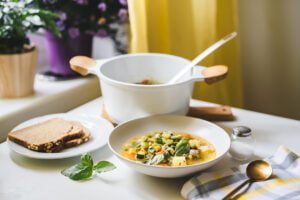
3. Heat Resistant
One of the outstanding features of ceramic dining tables is their remarkable heat resistance. Customers can confidently place hot dishes and cookware on their tables without fearing damage. This feature enhances the functionality and versatility of ceramic tables in a dining setting.
4. Spill Resistant
In a dining room, spills are bound to happen. Ceramic tables are inherently spill-resistant, making clean-up a breeze. So, customers can enjoy their meals without constant worry about accidental spills damaging their furniture.
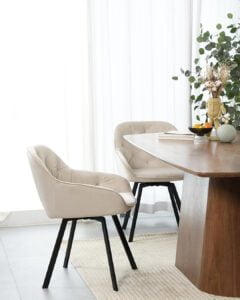
When you notized those benifit of ceramic dining table, I guess you must consider about selling ceramic dining tables.
Here are some tips for maintain a ceramic dining table more durable:
While ceramic tables are remarkably resistant to stains and scratches, using placemats and coasters is a good practice to ensure longevity. They provide an extra layer of protection against spills and hot dishes.
Cleaning a ceramic dining table is a straightforward process. We recommend using a mild detergent with warm water and a soft cloth. Avoid abrasive cleaners or scouring pads, as they can damage the ceramic’s finish. Regular cleaning ensures the table remains as good as new.
When it comes to purchase ceramic dining table, most furniture buyers can’t help comparing ceramic table to glass table, cause they have similar appearence after all. So we might as well keep talking about them, hereby we weigh the advantages and disadvantages of these two materials:
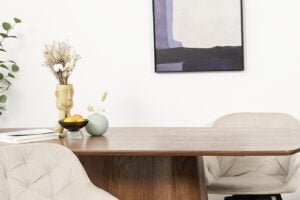
Ceramic Dining Tables VS Glass Dining Tables
Advantages of Ceramic Dining Tables:
Exceptional Durability: Ceramic dining tables are renowned for their outstanding durability. They can withstand the rigors of daily use in busy dining areas, making them an ideal choice for both homes and commercial settings. Ceramic is a robust material that resists chipping, cracking, and other forms of damage.
Stain and Scratch Resistance: Ceramic tables exhibit excellent resistance to stains and scratches. This property is highly valued in environments where spills and everyday wear are common. The surface is less porous than other materials, making it easier to clean and less prone to staining or scratching.
Heat Resistant: A significant advantage of ceramic dining tables is their ability to withstand high temperatures. You can confidently place hot dishes, pots, or pans directly on the table without causing damage. This heat resistance makes ceramic tables incredibly practical for serving warm meals.
Spill Resistant: Ceramic tables are engineered to resist spills. Liquid spills are less likely to penetrate the surface, and the material’s non-porous nature allows for easy cleanup. This feature minimizes the risk of permanent stains and simplifies maintenance.
Disadvantages of Ceramic Dining Tables:
Heavier than Glass: One of the notable disadvantages of ceramic tables is their weight. They are generally heavier than glass tables, which can make moving or rearranging them more challenging. Consideration must be given to the table’s placement and the ease of transportation.
Requires Proper Maintenance to Retain Luster: While ceramic tables are relatively low-maintenance, they still require care to maintain their luster over time. Regular cleaning and occasional maintenance steps are essential to preserve the table’s appearance. Failing to do so can lead to a loss of shine.
Advantages of Glass Dining Tables:
Aesthetically Pleasing, Creating an Illusion of Space: Glass dining tables are prized for their elegant and visually open appearance. The transparency of glass creates an illusion of space, making them a great choice for smaller rooms. They can enhance the overall aesthetics of a dining area.
Easy to Clean and Maintain: Glass tables are incredibly easy to clean. A simple wipe with a glass cleaner can keep the surface spotless. This convenience is appealing to those who prefer a hassle-free cleaning process.
Lighter and Easier to Move: Glass dining tables are notably lighter than their ceramic counterparts, which simplifies the process of moving and rearranging them. This feature can be especially advantageous if you frequently change your dining area’s layout.
Disadvantages of Glass Dining Tables:
Prone to Scratches and Chips: One of the primary disadvantages of glass tables is their susceptibility to scratches and chips. While the surface is resilient to stains, it is relatively soft compared to ceramic, making it more prone to physical damage.
Limited Heat Resistance: Glass tables have limited heat resistance. Placing hot items directly on the surface can lead to thermal stress, causing the glass to crack or shatter. This limitation necessitates the use of heat-resistant pads or trivets when serving hot dishes.
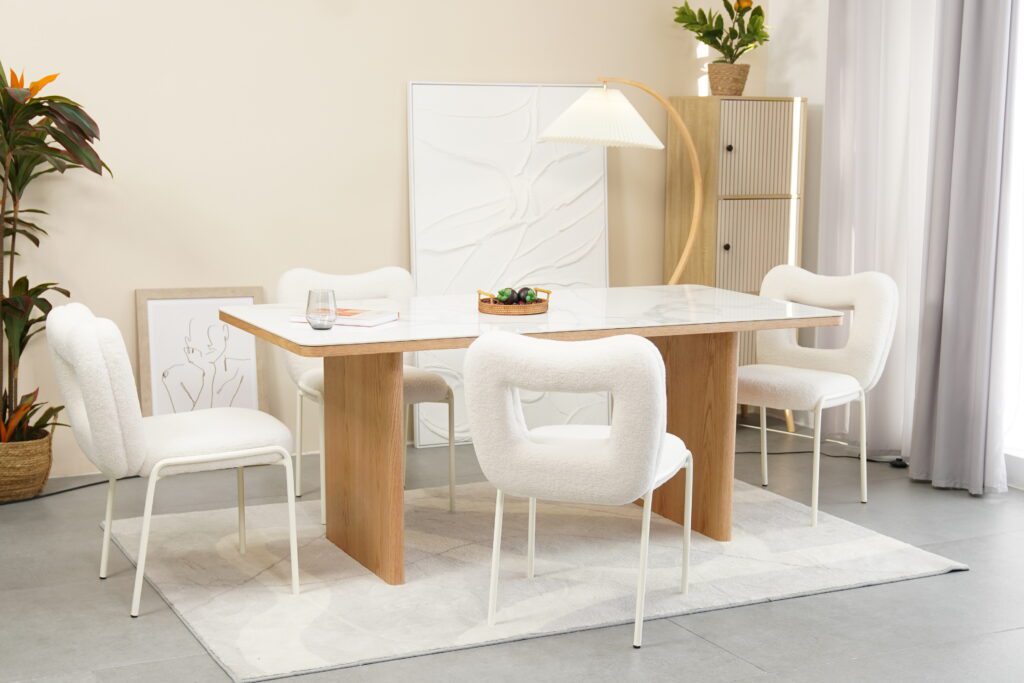
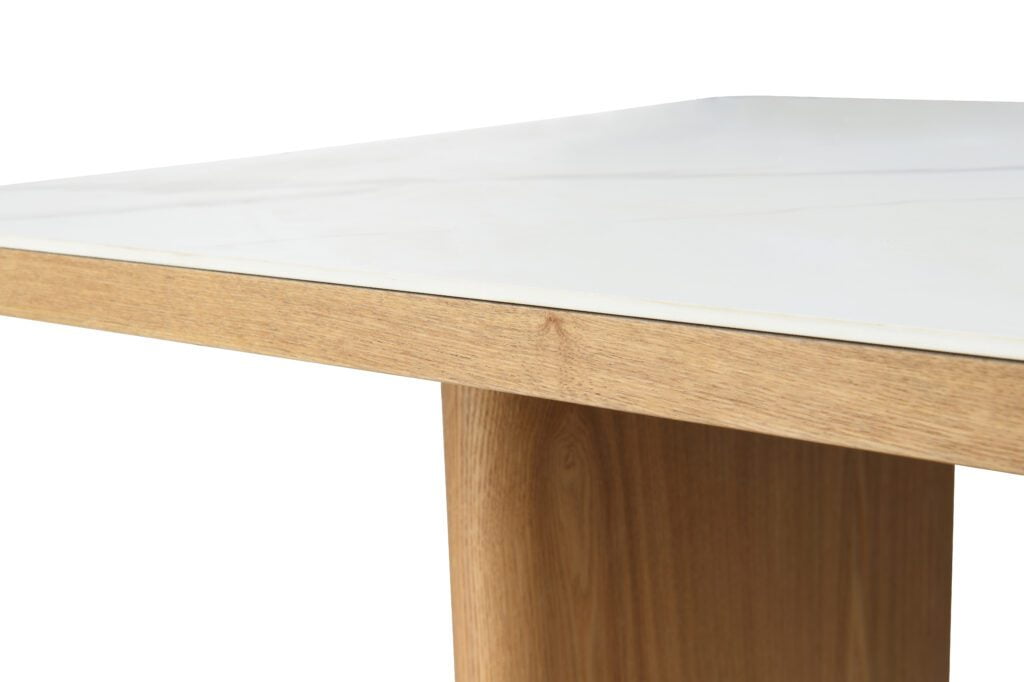
What Do We Offer?
In the realm of sophisticated dining experiences, the choice between a ceramic and glass dining table plays a pivotal role. As a distinguished B2B company offering exquisite furniture solutions, we bring forth a compelling comparison, spotlighting the distinctive features of our black marble texture ceramic slate dining table with walnut veneer cover and our glass dining table.
Ceramic Dining Table: Where Durability Meets Timeless Elegance
Our ceramic dining table stands as a testament to the fusion of durability and timeless aesthetics. Crafted with precision, the table features a black marble texture ceramic slate, ensuring unparalleled strength and resistance. What sets our ceramic dining table apart from conventional options is the additional layer of walnut veneer that gracefully envelopes the exterior.
Advantages of Our Ceramic Dining Table:
Exceptional Durability: The black marble texture ceramic slate forms a robust foundation, ensuring longevity and resilience against daily wear.
Stain and Scratch Resistance: Embracing the inherent advantages of ceramic, our table effortlessly repels stains and resists scratches, maintaining its pristine appearance over time.
Heat Resistant: A key attribute of ceramic, our dining table can confidently accommodate hot dishes without compromising its structural integrity.
Spill Resistant: Engineered to resist spills, the non-porous surface facilitates easy cleanup, reducing the risk of permanent stains.
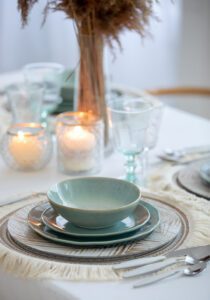
Unique Feature:
The incorporation of walnut veneer serves a dual purpose:
Walnut Aesthetics: The veneer imparts a rich walnut appearance, elevating the table’s visual appeal and creating a warm ambiance.
Low-Maintenance Luster: Unlike traditional ceramic tables, ours requires minimal maintenance to retain its luster. The walnut veneer ensures enduring brilliance, negating the need for meticulous care.
Glass Dining Table: The Art of Sublime Simplicity
In the world of design, glass dining tables epitomize timeless elegance and minimalist charm. As purveyors of sophistication, our glass dining table effortlessly captures these qualities.
Advantages of Our Glass Dining Table:
Aesthetic Appeal: The transparent nature of glass imparts an aesthetic charm, creating an illusion of space and enhancing the overall ambiance.
Ease of Cleaning: Glass surfaces are inherently easy to clean, requiring a simple wipe with a glass cleaner to maintain a spotless appearance.
Lightweight and Maneuverable: Compared to ceramic alternatives, our glass dining table is notably lighter, facilitating ease of movement and rearrangement.
Considerations:
Prone to Scratches and Chips: While resistant to stains, glass is more susceptible to scratches and chips. Care should be taken to avoid abrasive contact.
Limited Heat Resistance: Glass has limited heat resistance, necessitating the use of heat-resistant pads or trivets to prevent thermal stress.
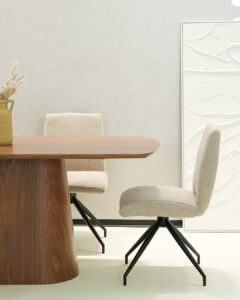
So with all that, our ceramic and glass dining tables represent a harmonious blend of functionality and aesthetics. Whether you opt for the enduring allure of ceramic with walnut veneer or the timeless simplicity of glass, our offerings are designed to elevate the dining experience.

